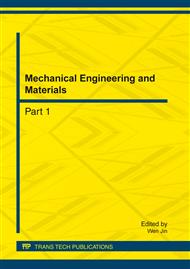p.1464
p.1470
p.1477
p.1483
p.1487
p.1492
p.1498
p.1505
p.1509
Evaluation Dispatching Rules for Two-Stage Hybrid Flow Shop Scheduling with Parallel Machines
Abstract:
This paper considers two stage hybrid flow shop with identical parallel machine and evaluate performance of common dispatching rules; shortage processing time (SPT) longest processing time (LPT) earliness due date (EDD) and first in first out (FIFO). The objectives are to determine makespan and total tardiness have been minimized. To evaluated performance of dispatching rules, the results have been compared on each criterion. The experimental results show that SPT outperform than other rules with minimizes makespan as an objective function for all problems. On the other hand, for minimize total tardiness as an objective. The EDD rule outperform than other rules.
Info:
Periodical:
Pages:
1487-1491
Citation:
Online since:
January 2012
Authors:
Keywords:
Price:
Сopyright:
© 2012 Trans Tech Publications Ltd. All Rights Reserved
Share:
Citation:


